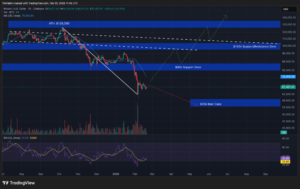Last updated:
 Why Trust Cryptonews
Why Trust Cryptonews
Ad Disclosure
We believe in full transparency with our readers. Some of our content includes affiliate links, and we may earn a commission through these partnerships. Read more

The U.S. Securities and Exchange Commission (SEC) has filed a lawsuit against Nova Labs, the creator of the open-source Helium Network, just days before SEC Chair Gary Gensler is set to step down on January 20.
Gensler, a vocal critic of cryptocurrencies, has been instrumental in enforcing regulations on the crypto industry during his tenure.
The SEC accuses Nova Labs of selling unregistered investment products, including “Hotspots,” devices used to mine Helium’s native cryptocurrency (HNT), and a program called “Discovery Mapping,” which allegedly allowed users to exchange personal data for crypto.
SEC Says Nova Labs Offerings Constituted Unregistered Securities
In its January 17 statement, the SEC asserted that these offerings constituted unregistered securities.
This move comes against the backdrop of ongoing tensions between the crypto industry and the SEC, with the term “unregistered securities” becoming a recurring theme under Gensler’s leadership.
Notably, Ripple Labs scored a significant win in July 2023 when a court ruled that its XRP token did not qualify as an unregistered security in programmatic sales on exchanges, though the SEC promptly appealed the decision.
The lawsuit also claims Nova Labs misled investors by falsely suggesting that major companies like Lime, Nestlé, and Salesforce were utilizing its wireless network, a claim the SEC contests.
As leadership changes at the SEC on January 20, there are reports that the agency might reassess its approach to crypto enforcement.
According to a January 15 Reuters report, the SEC may pause litigation in cases that do not involve fraud, focusing instead on allegations of securities law violations.
The lawsuit against Nova Labs signals the SEC’s continued scrutiny of the crypto sector, even as speculation swirls about potential shifts in regulatory priorities under new leadership.
Crypto Industry Lost $1.49B to Hacks and Fraud in 2024
As reported, the crypto industry witnessed losses totaling $1.49 billion in 2024 due to hacks and fraud, marking a 17% decrease from 2023.
According to a report by blockchain security platform Immunefi, hacks were overwhelmingly the primary cause, accounting for $1.47 billion or 98.1% of the total losses across 192 incidents.
Fraud, including rug pulls and scams, represented just 1.9% of the losses at $28 million, though this category saw a 72% increase year-on-year.
The decline in total crypto losses reflects improved security measures, as the number of successful attacks also fell by 27.5%, from 320 in 2023 to 232 in 2024.
Japan’s DMM Bitcoin exchange suffered a $305 million private key breach in May, while WazirX, India’s top crypto exchange, lost $235 million in July after hackers compromised its Ethereum-based multisig wallet.
Together, these two events accounted for 36% of the total losses.
Decentralized finance (DeFi) protocols remained prime targets, representing 51.4% of the losses, while centralized finance (CeFi) platforms accounted for 48.6%.
Notably, CeFi losses surged by 77.5% year-on-year, reaching $726 million.
Ethereum and Binance Smart Chain were the most attacked blockchains, with Ethereum facing 104 incidents that led to 44% of total chain losses.



















